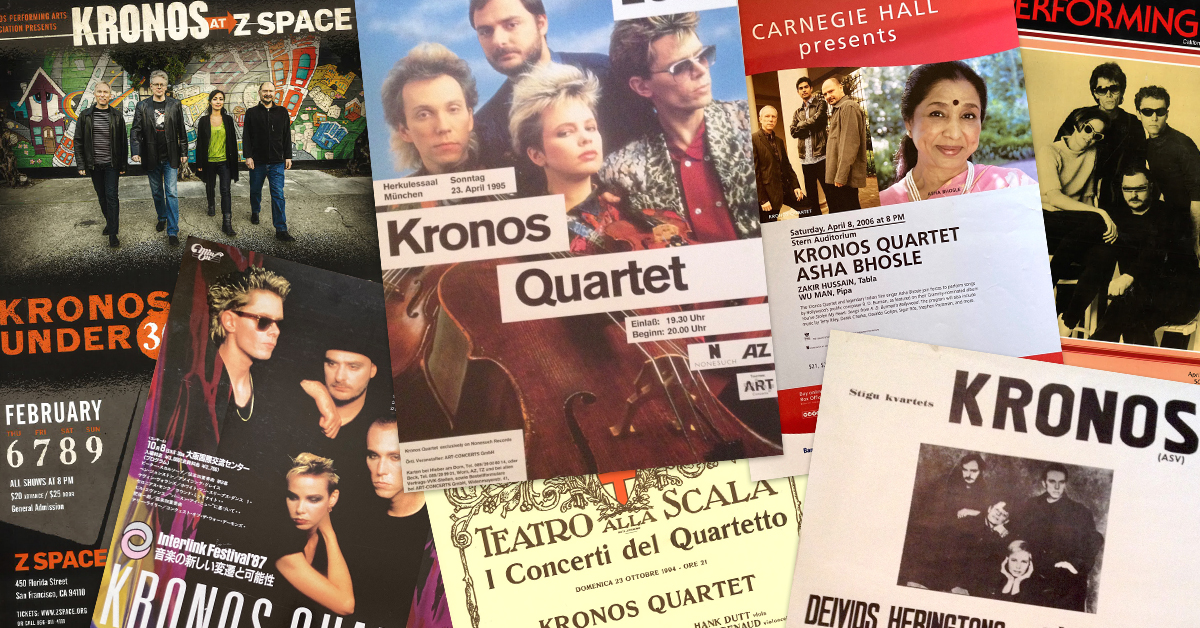The Library of Congress has acquired the collection of manuscripts, instruments, costumes, video and audio recordings, and more from Kronos Quartet and its non-profit organization, Kronos Performing Arts Association. “It’s gratifying to know that Kronos’ legacy will be preserved in perpetuity alongside the manuscripts and other treasures of so many other influential musicians from the US and around the world," said KPAA Executive Director Janet Cowperthwaite. "We are perhaps even more excited to reflect upon all the musicians and scholars who will have access to these materials in years to come, informing their own work and carrying Kronos’ inspiration and influence into the future.” The Library also appointed Kronos founder, artistic director, and violinist David Harrington as the Kluge Chair in Modern Culture and inducted Kronos’ 1992 album Pieces of Africa into the National Recording Registry.
The Library of Congress has acquired the collection of manuscripts, instruments, costumes, video and audio recordings, and more from Kronos Quartet and its non-profit organization, Kronos Performing Arts Association.
The Library has also announced the appointment of Kronos founder, artistic director, and violinist David Harrington as the Kluge Chair in Modern Culture by the Library’s John W. Kluge Center, the Library’s in-house center for scholarship and research. While in residence at the Kluge Center in 2024, Harrington will be working with the collections of the Library of Congress to uncover stories that may be woven into future Kronos projects. The Library announced last week that Kronos’ pioneering and influential album Pieces of Africa, released on Nonesuch in 1992, has been inducted into the National Recording Registry of audio treasures.
Founded at a time when the form was largely centered on long-established, Western European traditions, Kronos has been at the forefront of revolutionizing the string quartet into a living art form that responds to the people and issues of our time.
During the longevity of its career, the quartet has commissioned more than 1,100 works, released more than 70 recordings, toured internationally, altered the expectations of concert presentation, made chamber music accessible to wider audiences, and more, all while remaining dedicated to its aesthetics, ethics and quality. It is therefore fitting that the Library of Congress will become the home to various items from the Kronos collection.
"Kronos Quartet's impact on contemporary music is hard to overstate," said Susan H. Vita, chief of the Library's Music Division. "It is ideal for the quartet's legacy as cutting-edge multidisciplinary artists and commissioners of living composers to be preserved here at the Library of Congress, an institution which itself plays a role in the creation of new music and which has long been a preeminent international destination for the living string quartet tradition."
“We are thrilled to place our archives with the Library of Congress,” said Janet Cowperthwaite, executive director of Kronos Performing Arts Association, the nonprofit organization of Kronos Quartet. “It’s gratifying to know that Kronos’ legacy will be preserved in perpetuity alongside the manuscripts and other treasures of so many other influential musicians from the United States and around the world. And, as an organization devoted to innovation in music, we are perhaps even more excited to reflect upon all the musicians and scholars who will have access to these materials in years to come, informing their own work and carrying Kronos’ inspiration and influence into the future.”
Kronos Quartet first performed in the Library’s Coolidge Auditorium in November 1986 and just returned on April 18. The Archive of Kronos Quartet / Kronos Performing Arts Association complements many collections held by the Music Division. This includes papers and music manuscripts of numerous composers commissioned and/or performed by the quartet—such as those of John Adams, George Crumb, and Charles Mingus. Kronos brings the Library's history of quartet performances and commissions into the modern age, reaching new audiences, while exploring and forging new territory for the tradition, which has had a 100-year history at the Library.
“The Music Division’s connections to string quartet ensembles and string quartet performances—even right down to our famed Stradavari instruments—occupy a large slice of music history. It is fitting that the exceptional history of Kronos Quartet becomes part of this storied history,” said Vita.
For more information, visit loc.gov.
- Log in to post comments



